I chose today’s word of the day after spending the afternoon on an illuminating tour of the city of Berlin. Jamie, our tour guide, is a professional archaeologist who completed his PhD at the University of London and just finished a two year archaeology project in Rome sponsored by the University of Durham. He was a great guide: humorous, down-to-earth, insightful, and discerning of when our group needed to come in out of the cold. Early in the tour he shared a quote from the German author Karl Scheffler that I’ve been savoring during our first day in Berlin: “Berlin is a city condemned forever to becoming, never to being.” Becoming. I love that word, and the statement so well describes the uniqueness of Berlin–on the one hand an ancient city, but also a city wracked by centuries of conflict that is constantly rebuilding itself. Pockmarked stone pillars stand 100 meters from the Alte National Gallery, evidence of the final battle in Berlin that ended World War II. Old buildings stand alongside newly renovated ones, which stand just blocks away from brand new buildings ascending beneath multistory cranes. A city that once included a 96 mile long wall surrounding its western half has over the last two decades erased nearly every trace of this infamous legacy while erecting a growing array of memorials to those victimized in the ideological conflicts of the German past. Berlin. Always in the state of becoming, never being.
In German “to become” can be translated simply as werden. But as I’ve been thinking about today’s blog post, I realize now I need to spend more time reviewing German grammar. I’m unclear about a German grammar concept. Forgive me for the moment for the dryness of what I’m about to discuss. If you aren’t interested in grammar, just skip the next two paragraphs.
A review of some basic grammar: A “gerund” is a verbal form that functions as a noun. For example, in the sentence “I love running,” the word “running” is a noun that serves as the direct object of main verb in the sentence. “Running” is a gerund. In English, gerunds are formed by using the present participle form of the verb. In most English verbs this is the infinitive form with an -ing ending.
Here is my question: how are gerunds formed in German? (Note: Scheffler’s actual quote doesn’t rely on gerund forms, but bear with me here). Initially I assumed that German might also use the present participle form, in which case the verbal form “becoming” would be werdend. However, I don’t think that is correct. For one, noun forms in German are usually capitalized. Further, after doing some research I am beginning to think that German gerunds are formed simply by attaching the neuter definite article to the infinitive form of the verb. Thus, the gerund form of werden is simply, “Das Werden.” Is this correct? If so, my followup question: what role does the present participle play in German? If gerunds are formed with neuter definite articles and infinitives, then it seems the only other role that present participles play would be to communicate present action that is continuing (i.e. the present progressive tense). But my understanding is that in German the present tense is used to convey present action, either progressive or non-progressive. So in short, what is the purpose of present participles in German?
Okay, enough grammar. I took many pictures today during our tour, but rather than turn this into a typical tourist travelogue, I’l simply upload my pics to Facebook later for interested family and friends and focus on two standout moments from the day. The first involves a humorous exchange I had with the tour guide near the end of our tour. We were standing not far from one of the three remaining sections of the Berlin Wall in front of a massive office complex that served as the headquarters of the German Luftwaffe during World War II. I was reminded of my dad’s love for World War II history. The building was one of the few war-making facilities in Berlin that sustained only minor damage during Allied bombing, and it remains in use today. It’s hard to convey the size of the building in a single picture.
As we were walking the length of the building exterior, I had this conversation:
Vic: “So what is this building used for now?”
Jaime: “While the building no longer serves as the headquarters for the German Luftwaffe, what happens in the building still makes Europeans quiver in fear. This is the German finance ministry.”
Vic: “Hmmm. So which do Europeans think is more damaging: the German Luftwaffe, or the finance ministry?”
Jamie: “(Laugh out loud) Hmmmm. I would say the finance ministry.”
On the other side of the building we were greeted by the most ironic of murals, a GDR era piece of art that idealized the socialist revolution. The picture of a smiling proletariat marching together toward a classless, utopian future contrasts vividly with the reality of the Berlin uprising of 1953, protests which centered outside this building.
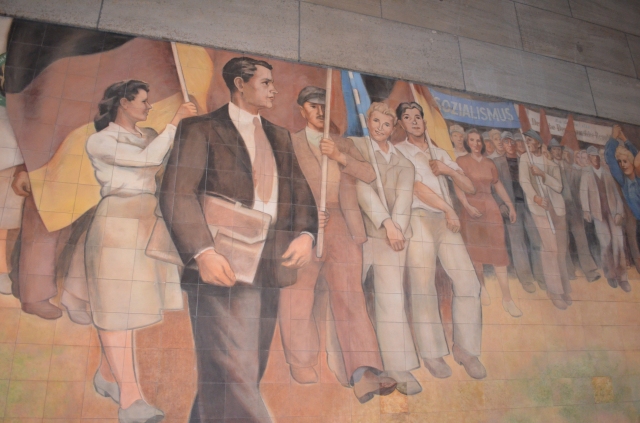 So much more that could be said here, but it’s getting late, so I’ll close with a final memorable moment: our dinner at the Gaffel Haus. Theo and I decided to be brave tonight, so we selected an assorted plate of regional German meats, including Kölner Blut (Black Pudding), Leberwurst (Liver sausage), and hausgemachtem Mett (minced meat) as well as bread and smoked gouda cheese. I have never had black pudding before and wanted to try it. Here is what came to our table:
So much more that could be said here, but it’s getting late, so I’ll close with a final memorable moment: our dinner at the Gaffel Haus. Theo and I decided to be brave tonight, so we selected an assorted plate of regional German meats, including Kölner Blut (Black Pudding), Leberwurst (Liver sausage), and hausgemachtem Mett (minced meat) as well as bread and smoked gouda cheese. I have never had black pudding before and wanted to try it. Here is what came to our table:
Black pudding is a type of blood sausage made from congealed pigs blood. That sausage (on the left, under the onion rings), was somewhat acceptable to the palette, but “somewhat” is being perhaps too generous if my student’s reaction to the samples I offered stand as evidence (pictures will eventually be available on facebook). What virtually none of us could handle was the mince meat. Ahhh, the mince meat. I was expecting some sort of concoction of cooked ground beef and spices. What they sent us was something closer to beef tartare. It was mostly ground beef, and it was entirely raw. A few of us sampled it, but the raw beef taste was impossible to stomach, so it went mostly uneaten. Fortunately, the portions of the meals others ordered allowed those of us unable to consume what we ordered to get our fill on their uneaten portions:
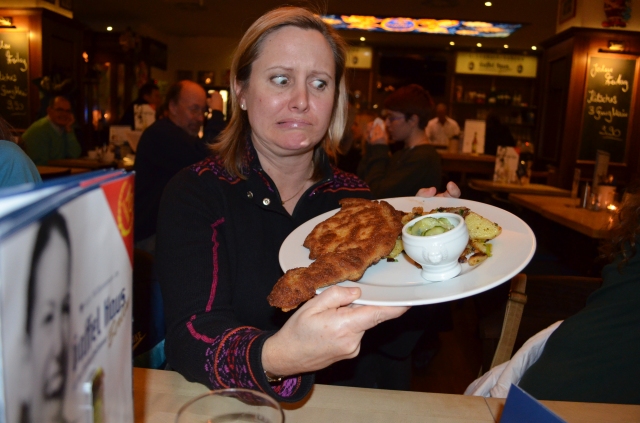 Great meal! I won’t be ordering black pudding again.
Great meal! I won’t be ordering black pudding again.
That’s all for now from Berlin. I’m sitting in a hostel lobby with twenty somethings playing fussball and pool, with the none too pleasant scent of cigarettes wafting somewhere in the distance, but close enough to smell. More tomorrow!

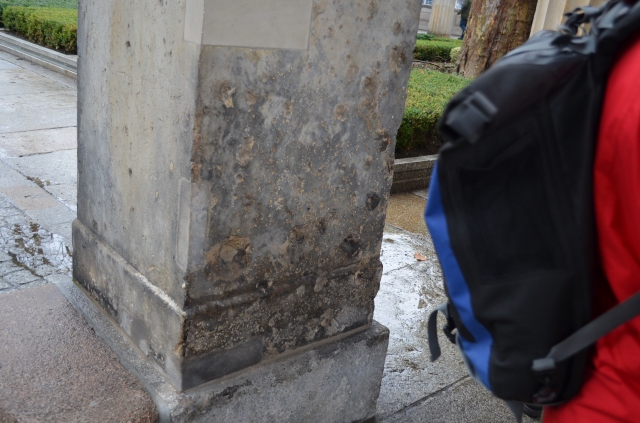
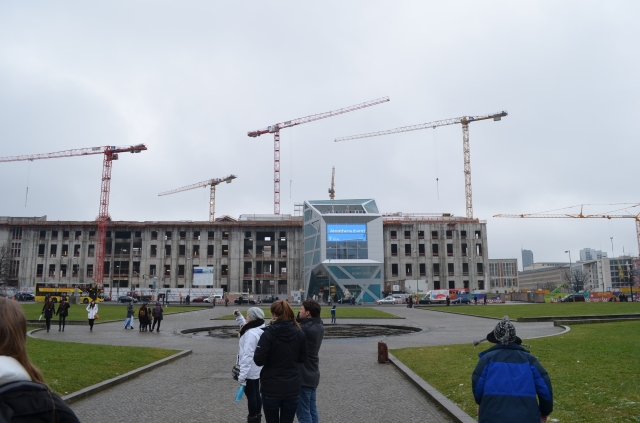
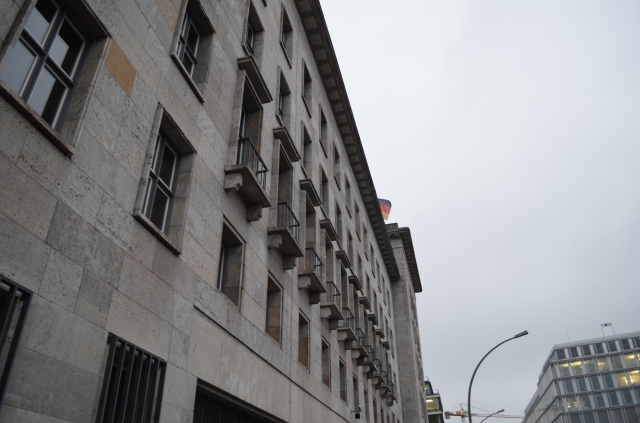
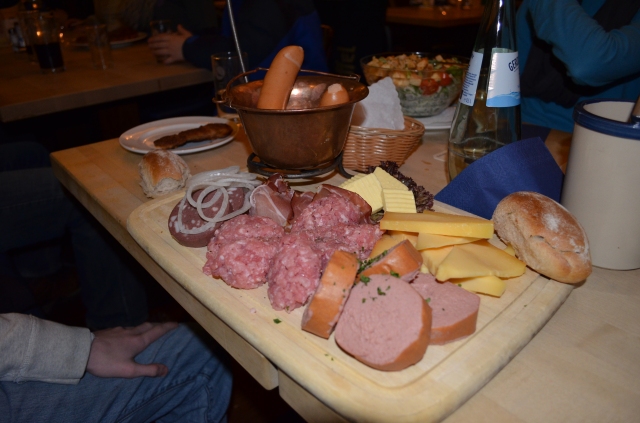
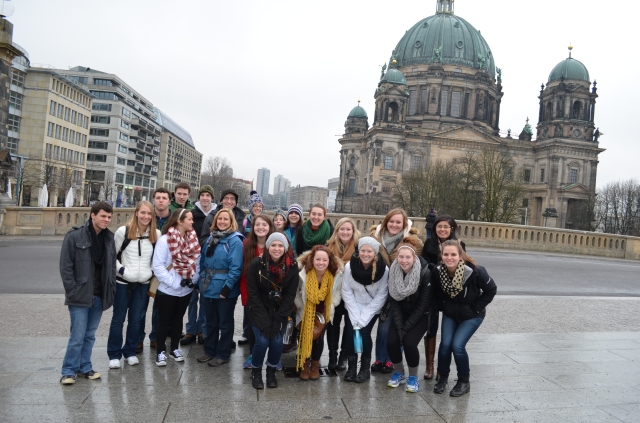
Oh, my goodness! What an interesting time you must be having. Please tell Tara that I won’t need any recipes from the above mentioned German dishes though. 😉
LikeLike
Victor, you are correct in your grammatical observations. German gerunds are formed by capitalizing the infinitive form of the verb and using the neuter/”das” definite article. Present participles, which are mostly used as adjectives are most commonly formed by adding a “d” to the infinitive form of the verb, much like we in English often add “ing” to our verbs to create present participles that are used as adjectives. For example, “die spielenden Kinder” = ” the playing children”. Yes most German food are extremely palatable, however, like any other “foreign” cuisine, there are always those exceptions. Haha!
LikeLike